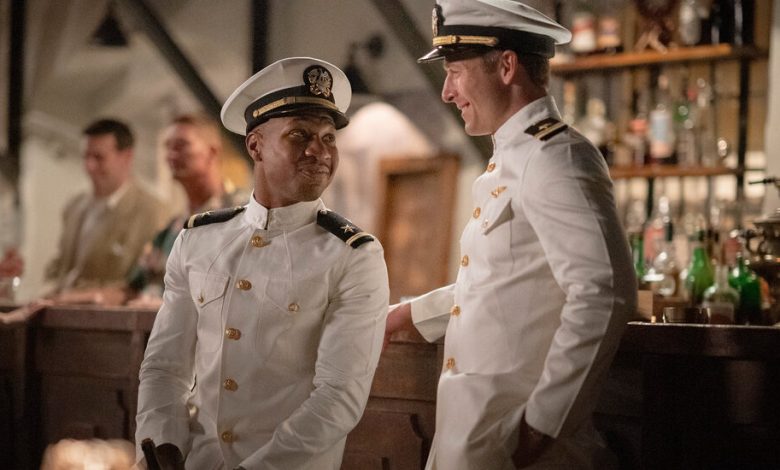‘Devotion’ Review: An Airman in Reflection

“Devotion,” directed by J.D. Dillard, recounts the landmark career of Ensign Jesse L. Brown, the son of a Mississippi sharecropper who became the U.S. Navy’s first Black aviator in 1948, and, two years later, its first Black officer to die in the Korean War. Brown’s wingman, a wealthy white United States Naval Academy graduate named Thomas J. Hudner Jr., risked his own life in an attempt to save Brown, and was subsequently awarded the Medal of Honor.
Their story could be simplified into a sentimental tale of colorblind brotherhood. (Adam Makos’s 2015 nonfiction book of the same name quotes a contemporary journalist as guilelessly cheering, “The key to Jesse’s popularity was his assumption that no race problem existed and, as a result, none did.”) Instead, Dillard and the screenwriters Jake Crane and Jonathan A.H. Stewart dig deeper into Brown’s pat quotes to the press, revealing a man who didn’t share his anguish with outsiders — a reticence their Brown, played at a lidded simmer by Jonathan Majors, seems to feel toward the very movie he’s in.
The goal is to scrub the symbolism off Brown and restore him to humanity: a 24-year-old striver, husband and father who loathes being singled out as a special case. His odd couple dynamic with the easy-grinning Hudner (Glen Powell) is the steadiest narrative thrust in a film that tends to drift from one set piece to another, much like the military itself in this sliver of years between the end of World War II and the rise of the Cold War era. Here, Brown and Hudner’s squad might be stationed in the Mediterranean to scare off Soviet ships and wake up from an evening spent in Cannes flirting with a teenage Elizabeth Taylor — a true story, modestly embellished — to learn they’re abruptly pivoting to snowy Sinuiju.
Dillard’s curiosity about this often-overlooked time of transition adds some shading to stretches that otherwise feel like a “Top Gun” prequel with the sleek jets swapped out for ungainly gull-wing Corsair propeller planes, heavy beasts that resemble a rockhopper penguin slumped over at the end of a saloon. Dillard and the cinematographer, Erik Messerschmidt, allow a scene or two of crowd-pleasing spectacle, say a dogfight with an enemy MIG, or a shot of ocean surf reflected in the steel belly of a skimming aircraft. But despite its emotional score, the film is more interested in unheroic details: insults ignored, insignia easily discarded, platitudes that dissipate in the air. It refuses to build to the kind of operatic weepie Brown himself wouldn’t respect. As an intellectual dismantling of white savior narratives, “Devotion” is smartly done; as an enjoyable heartwarmer to watch with your uncle, it’s stiff when it should soar.
Still, Majors — one of our most sincere actors — does sob early and often, particularly in a searing moment in front of a mirror when he stares directly at the lens and spits racist insults at his own reflection as though inuring himself to poison. This choice to keep his pain private becomes a window into how Brown wanted to be viewed in life and death: not as a victim in need of rescue, but as his own man.
Devotion
Rated PG-13 for strong language, smoking and scenes of war. Running time: 2 hours 18 minutes. In theaters.
